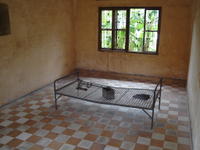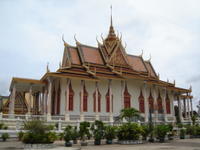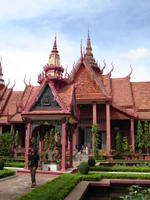 These atrocities are documented in two places in Phnom Penh. One is the Toul Sleng Genocide Museum (S-21), where it is thought more than 20,000 people passed through on their way to their deaths. Even children were tortured and killed. Originally a school, as a present day museum, Toul Sleng shows the horrors of what life was like for the prisoners as well as approximately 2500 portrait photographs of people who died there. On the top floor there is a new exhibit which shows pictures of an individual as well as a short biography.
These atrocities are documented in two places in Phnom Penh. One is the Toul Sleng Genocide Museum (S-21), where it is thought more than 20,000 people passed through on their way to their deaths. Even children were tortured and killed. Originally a school, as a present day museum, Toul Sleng shows the horrors of what life was like for the prisoners as well as approximately 2500 portrait photographs of people who died there. On the top floor there is a new exhibit which shows pictures of an individual as well as a short biography.

After people were interrogated and processed they were transported to Choeung Ek, located
 about 15km outside the city. Here, 86 mass burial pits have been excavated and 8985 bodies recovered. 43 more mass graves remain untouched. It is estimated that 17,000 people may have been buried there in total. Bones are still visible on the surface of the ground as you make your way between the excavated pits.
about 15km outside the city. Here, 86 mass burial pits have been excavated and 8985 bodies recovered. 43 more mass graves remain untouched. It is estimated that 17,000 people may have been buried there in total. Bones are still visible on the surface of the ground as you make your way between the excavated pits.A massive memorial has been built at the site. There are shelves inside it that extend from the floor to about 15 m in height. Each shelf is full of skulls that have been organized by sex and age.

This is just for this one portion of the country. There are museums and mass graves spread across all of Cambodia.
The only thing more incredible than the atrocities that occurred in this country is the ability of the people to move on, forgive, and rebound in a proactive manner. There is very little public support for any sort of war crimes trials so as to not reopen old wounds. In the 25+ years since Cambodia was relieved by the neighboring Vietnamese there has a been a resurgence of growth and relative prosperity.
The capitol is now completely inhabbited - although not all the streets are paved - and many of the cities once glorious buildings have been restored such as the Royal Palace, Silver Pagoda, and National Museum. Miraculously, the national museum still houses some of the finest statues from Angkor Wat and the other temple complexes north of Siem Reap.



Yesterday, I also had the treat of encountering a bunch of tuk-tuk drivers. Now, for those of you
 who have been to SE Asia and know that running into tuk-tuk drivers is usually a bad thing, this was a totally different experience. They completely ignored me as they played a game on sidewalk that used the natural grid system. They had a chunk of brick and a chunk of quartz rock and were playing what I determined to be connect 5. Get five squares in a row in any direction with your color and you win. Having figured it out I challenged one of the Tuk-tuk drivers to a game. Which I lost. I proceeded to lose the next. And the next. But I beat him the fourth time around after I figured out the strategy. I played with three different guys for a total of about 45 minutes. And yes, when I left they did ask if I wanted a tuk-tuk.
who have been to SE Asia and know that running into tuk-tuk drivers is usually a bad thing, this was a totally different experience. They completely ignored me as they played a game on sidewalk that used the natural grid system. They had a chunk of brick and a chunk of quartz rock and were playing what I determined to be connect 5. Get five squares in a row in any direction with your color and you win. Having figured it out I challenged one of the Tuk-tuk drivers to a game. Which I lost. I proceeded to lose the next. And the next. But I beat him the fourth time around after I figured out the strategy. I played with three different guys for a total of about 45 minutes. And yes, when I left they did ask if I wanted a tuk-tuk.Knowing that it was only about three blocks to my hotel I offered to play the guy for it. If he won I would pay him for a ride back to my hotel. If I won, he had to give me a ride for free. I ended up getting - grudgingly - a free ride back to the hotel!

3 comments:
another--albeit more cycnical--explanation for the lack of movement towards war crimes tribunals is that many former khmer rouge are still involved in the present government, and they're not too keen on the prospect of getting dragged to the Hague.
on a lighter note, you might want to try getting in touch with julie--she hopes to be heading from Manila to BKK in the next couple days, and then on to Angkor. and I'm sure she'd be glad for a travel buddy--did I mention earlier that she had her passport, camera, etc stolen in the Philippines?
I am headed back to HNL on the 30th of August. "termites holding hands" what is all that about?
Thanks for all of the great feedback! I really appreciate it.
Post a Comment